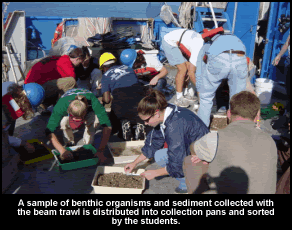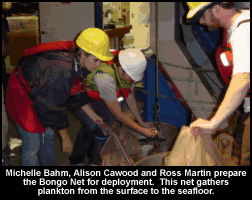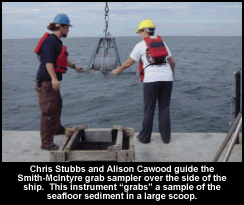BY RACHEL McEVERS
Special to The Post and Courier
Project Oceanica at the College of Charleston has just completed the third
leg of an exciting new program called Transects.
The Transects Program is designed to immerse and engage undergraduate students in oceanographic research by taking them to sea to collect biological, physical and geological samples that they will later analyze in the laboratory.
In November 2004, a total of 14 students (13 undergraduate and 1 graduate student mentor) sailed with two College of Charleston faculty members, Drs. Leslie Sautter (geology department) and Gorka Sancho (biology department) aboard the 92-foot research vessel Savannah (operated by the Skidaway Institution of Oceanography).
The cruise lasted five days and included sampling at 20 stations on the continental shelf between Charleston and the Gulf Stream, 60 miles from shore.
Also aboard were two visiting scientists from Coastal Carolina University, Dr. Scott Harris and Jamie Phillips.
 The
students worked eight-hour shifts around the clock, employing a wide range
of oceanographic equipment to sample the sea floor sands, the organisms
living along the bottom and the surface, and in the waters in between.
Two of the students were "graduates" of Leg 02 (May 2004), and
sailed as "watch chiefs," teaching and supervising the first-timer
Leg 03 students.
The
students worked eight-hour shifts around the clock, employing a wide range
of oceanographic equipment to sample the sea floor sands, the organisms
living along the bottom and the surface, and in the waters in between.
Two of the students were "graduates" of Leg 02 (May 2004), and
sailed as "watch chiefs," teaching and supervising the first-timer
Leg 03 students.
"The students were amazing," Sautter said. "After only 24 hours they understood the basics of the sampling process and took control of the entire operation. All Gorka and I had to do was direct traffic and oversee the sampling."
All students worked in collaborative teams to get the job done efficiently
and safely.
 "They
left the dock as students and returned as ocean scientists," Sautter
added.
"They
left the dock as students and returned as ocean scientists," Sautter
added.
Several students felt right at home on a ship and didn't want to get off at the end. Elizabeth Symon, a marine biology major, said, "This research cruise is a once-in-a-lifetime experience that, without a doubt, has fueled my desire to pursue my dream and has opened up my world to the loads of opportunities that await me in the future of marine biological and oceanographic research."
Along with the collection of sediment and marine organisms, students sampled the water from the surface to the seafloor and measured its chemical and physical characteristics. They also were able to work with state-of-the-art seafloor mapping technology (side scan sonar and sub-surface seismic profiling), provided by Coastal Carolina University. These instruments send out pulses of sound that are reflected off the surface and sub-surface of the sea floor, creating an image on a computer screen.
The students are enrolled in Sancho and Sautter's course, oceanographic research. They will analyze most of the 250 samples collected, while conducting individual research projects.
By the semester's end, each will present his results in a public forum and write a research manuscript. Student research results will later be posted on the Project Oceanica Web site at oceanica. cofc.edu.
Sancho emphasized that, "Our objective is to prove that students can collect, process and analyze research-quality data while they learn oceanography firsthand."
An inventory of the data and samples collected will be posted on the Web site on a growing database for anyone to use for educational or scientific purposes.
 Transects
is funded for two years by a grant written by Sautter and Sancho from
the National Science Foundation.
Transects
is funded for two years by a grant written by Sautter and Sancho from
the National Science Foundation.
A total of four five-day research cruises and follow-up oceanographic research courses will be offered over the two-year project. On each cruise, the same stations will be revisited, so that students will be able to examine the seasonal and inter-annual changes that occur. The next cruise is scheduled for May and the course will follow during the first summer session.
A new scientific crew will participate on each cruise. Sautter and Sancho already are making plans to collaborate with other institutions to maintain and expand the program regionally.
Project Oceanica was founded in 2001 with grant support from the NOAA Coastal Services Center. It is housed in the College of Charleston's Geology Department. For more information on the Transects Program and other programs, contact Project Oceanica at oceanica@cofc.edu or visit the Project Oceanica Web site at http://oceanica.cofc.edu.
Rachel McEvers is program manager of Project Oceanica.